Whether you’re planning a family camping expedition or have finally arranged that fishing trip, you may consider what tent you’ll need. With so many camping tents on the market, deciding which tent fits the occasion can be confusing. Below we’ve got 20 tips to help you choose a tent for camping.
When choosing a tent for camping, you need to consider several factors. You need to ask how many people will use it, if the tent’s weight is important (especially if you’re planning to backpack with it), if you’ll be bringing a pet, and if you’ll need extra insulation for colder temperatures.
Alongside these tips, we’ve got more below that give you all the advice to help you choose the right tent for your trip!
20 Tips to Help You Choose A Tent For Camping
Below we’ve got 20 tips to help you choose a tent; some tips are more obvious, like asking how many people will fit in the tent, and some are more obscure such as asking if you need a blackout tent or if you’ll be cooking inside.
Whatever the answer, we’ve got the guidance to help you choose your dream tent.
1. How Many People?
The first question to ask yourself before choosing a tent is how many people you need to fit inside. Is this tent for two or a family?
If you’re purchasing a tent with small children, think about choosing something that has space for when they grow.
Whereas if you purchase a tent for multiple purposes, it’ll be handy to have a couple of extra sleeping spots.
Remember, the tent capacity is based on how many people can sleep lying flat inside the tent. It doesn’t account for how much gear you might have.
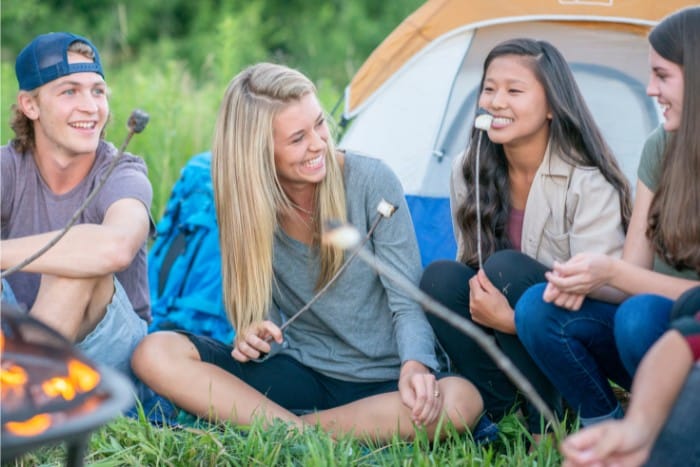
2. What Will the Weather Be Like?
Next, you need to consider what weather you’ll use the tent. 3 season tents will give you reasonable protection from the weather in the autumn, spring, and summer.
Compared to 4 seasons tents that are made primarily for winter camping. 4 season tents are usually capable of withstanding extreme weather, such as heavy snow, high winds, and even sand storms.
4 season tents will have more features, such as a rain fly that has multiple down points, and this prevents your tent from flying off.
If you’re planning to use your tent in the summer, opt for a 3-season tent, as this will be cheaper and lighter.
3. What Temperature Will it Be?
To choose a tent for camping, it’s best to ask yourself what is the lowest temperature you would go camping in.
If you plan to go mountaineering camping or camping in cold winter conditions, you’ll want a tent with more insulation.
More insulated tents will have a full coverage rainfly as part of their double wall, which keeps you as warm as possible.
On the flip side, if you’re camping in warm conditions, you don’t want to cook alive inside your tent! To avoid this, opt for a tent that has thinner walls.
4. Does the Tent Have Ventilation?
Ventilation is important to allow airflow of oxygen to your tent. When it’s cold outside, it can feel tempting to keep out as much cold air as possible, but ventilation in a tent is essential.
It ensures you have fresh oxygen. Tent ventilation is also vital to prevent condensation build-up inside the tent.
Condensation inside your tent can drip down to make your belongings wet, and if it seeps through your sleeping bag, it will make you cold. Make sure you choose a tent that has vent pockets on the roof.
This means the hot air from your body will rise and be filtered out.
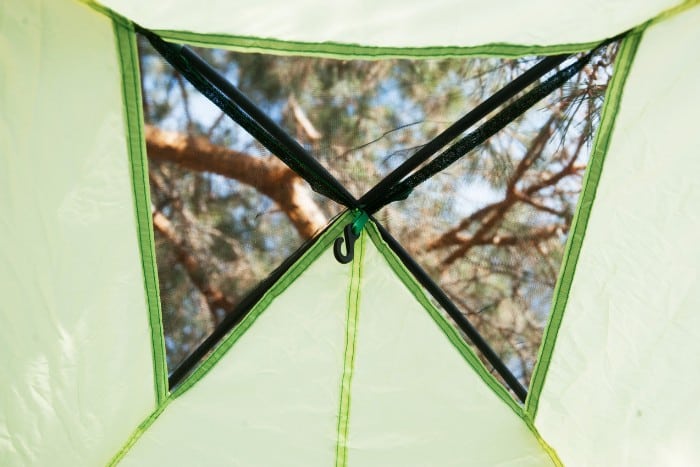
5. Weight of Tent
The weight of a tent is crucial. You need to consider if you’ll be using the tent for backpacking or if it’ll be a stationary home. Tents for groups will likely be heavier than for two, but it can take a closer inspection.
Thicker tent fabrics, such as canvas, will be much heavier than polyester. If you plan to pitch your tent further from your car or hike to your campground, you’ll want a lighter tent.
Even if you plan to move the tent from your car to the campsite, consider how some tents will be too heavy to carry even short distances.
6. Extra Room for Gear?
When selecting a camping tent, it’s good to ask what extra gear needs to fit inside the tent. This could include fishing gear, a yoga mat, or hunting gear. It all needs to go somewhere!
Choose a tent with enough room for any of your favorite camping pastimes. Extra gear might also encompass pets and their gear. Think about how much space you’ll need for a dog’s bed.
7. How Much Time Will You Be Spending in the Tent?
Depending on the weather, you may not know how much time you’ll spend in a tent. If you have planned fishing trips or hiking, you’ll likely only need your tent for sleeping.
In this case, you won’t need extra space inside your tent for daytime use.
On the other hand, if you are looking for a family tent you can spend time in when it’s raining, it’s better to choose a tent with a hall or an extra room.
8. Are You a Morning Person?
Believe it or not, several blackout tents allow you to sleep in later without the sunrise disturbing your slumber. This can be handy if you plan to camp where the sun rises at 5:30 am.
Getting up that early every day can be a killer! If you are a morning person, you can choose a tent that lights up during the day breaks.
Darker tents will prevent more daylight from coming in than lighter-colored tents, which will help let the light in.
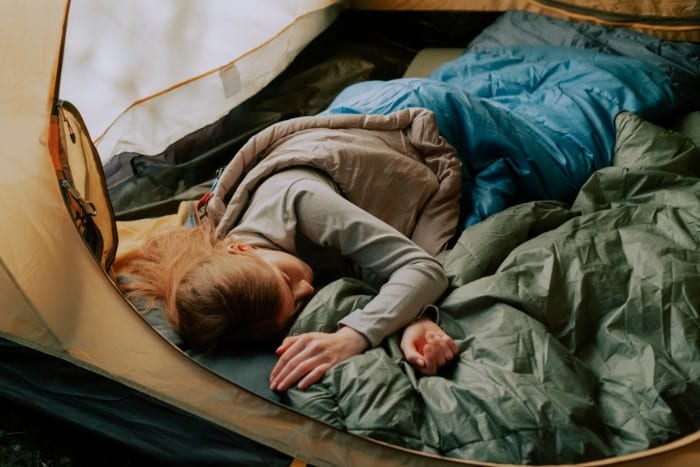
9. Windows?
Windows can help to make your tent feel just like home. Having windows may not be as crucial if you are busy with activities throughout the day.
If you plan to spend a lot of time inside, you may prefer having a couple of windows to watch the day through. It’s also handy to have windows if the weather is unpredictable.
It can help the tent feel less claustrophobic.
10. Ease of Setting Up?
The pop-up tent is popular for its easy set-up. You’re only required to remove it from the bag! However, a pop-up tent is not practical for all terrain.
It’s good to ask how easy a tent is to set up before you dive into buying one. Some tents require several people to set them up, while others may have fiddly poles.
For example, one person putting up a 6 person tent may struggle.
11. Height of Tent?
The height of a tent can come down to personal preference. If you like to stand up inside the tent, you’ll have to ensure the tent is tall enough.
This may be helpful for bigger tents, where moving around inside is easier when the tent is taller. On the other hand, if you are looking for a tent to take winter camping, you may want to choose a short tent.
Short, smaller tents allow you to trap more heat, improving the tent’s insulation. If you opt for a tall tent, recognize that the added height could make the tent cooler.
12. What Type of Bed will You Be Sleeping On?
Your choice of tent could be affected by what bed you’d like to sleep on. This will also impact the height of the tent.
You can use many different types of beds inside a tent: a tent cot, a sleeping pad, an inflatable mattress, and even a hammock!
An inflatable mattress may be more comfortable than a sleeping pad, but you’ll have to choose a tall tent to fit it in!
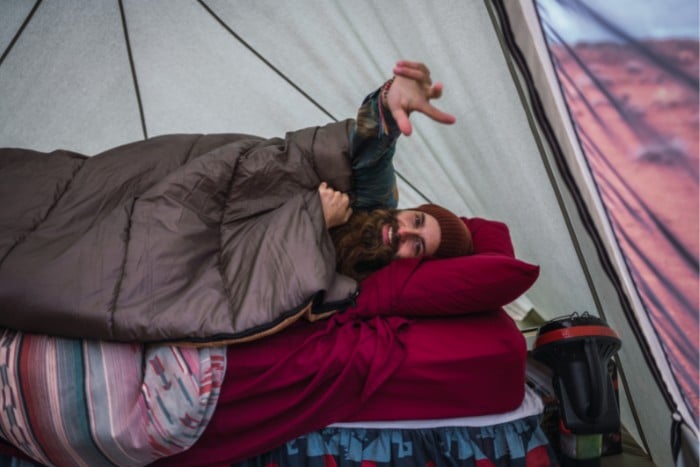
13. Tent Fabric?
Tents come in a range of fabrics and these will impact how warm, dry and breathable your tent is. A tent made from canvas will have walls thicker than a synthetic tent.
This helps the tent to prevent the sun from heating your tent. It’s also a good insulator for any warmth you want to keep in.
On the other hand, tents made from synthetic material like nylon will be more breathable than canvas, which will help the tent to ventilate.
However, the tent’s ability to protect against the sun and how well it insulates will be impacted if the tent’s fabric is thinner.
14. Single or Double wall?
Do you want your tent to be single or double-walled? This is not a trick question, as you can choose from a variety of tents that either have 1 wall between you and the outside or 2.
Single-walled tents are extremely lightweight and so are better for backpacking. Single-walled tents are waterproof, but if you’re unsure how the weather will be, choose a double-walled tent.
Tents with a double wall will have a tent body with a rainfly over the top. The rainfly is completely waterproof, while the tent body will allow for ventilation.
Before you decide which one you need, consider what purpose you’ll need it for, does a waterproof exterior matter more than the weight?
15. Free Standing?
Another consideration would be if the tent is free-standing or not. Free-standing tents have poles to help keep their shape without needing to be staked down.
While non-freestanding tents need stakes to form their shape, this would include teepee tents.
Free-standing tents usually hold up better against the wind, as their structure is slightly stronger and more reliable.
With a non-freestanding tent, the whole tent’s shape could be compromised by a broken guide rope or pole.
16. Tent Flooring?
You may want to check what tent floor you will have before purchasing a tent. Usually called the bathtub floor, this will be important to check if you intend on bringing a pet with you.
With a thin or poor-quality bathtub floor, your tent bottom may not last long if your pet has claws. You can improve the flooring in several ways, such as by putting down a thick tarp or foam board.
Make sure you consider how durable your tent flooring is!
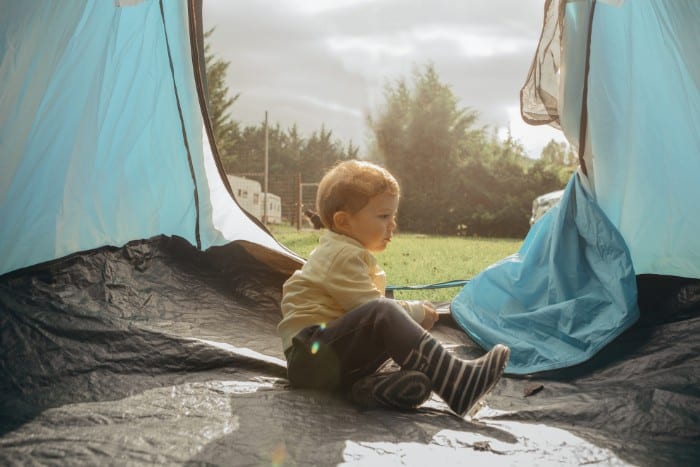
17. Are you Cooking inside?
If you plan to be camping in the winter on longer trips, you may be considering choosing a tent set up for a wood stove. With the risk of carbon monoxide poisoning, not all tents are safe to cook inside.
There are, however, several tents you can choose from that are safe for cooking. These will have fire retardant protection to make them safe to use inside. These tents are great for fishing or hunting trips!
18. Durability
If you’re looking for a tent that’s going to last several years then you want to check how durable it is.
This means you want to choose a tent made of strong material, with easy-functioning zips and flexible poles that won’t snap in heavy wind. Durability also comes down to how well you will take care of it.
If you take the time to look after a tent by airing it out after every use or fixing broken zips, it will last longer. A larger, more complex tent will need more care. Consider this before buying big!
19. Additional Features
When I’ve selected tents in the past, I’ve always enjoyed seeing what additional features the tent comes with. Additional features may include side pockets or room dividers.
The tent’s side pockets can be used to store small items such as your mobiles or watches. Room dividers in bigger tents can help campers to keep privacy.
Another feature that may help your tent decision is a tent door with two layers, one with a bug net and one that will close the entire tent.
These features can make your camping trip much more convenient without adding too much to the price!
20. Price
Tents can be budget-friendly, but they can also get extremely pricey.
The price depends on the fabrics used to build the tent, how sturdy the structure is, how big it is, what additional features it has, and what weather it can withstand.
Price also comes down to branding. Brands with renowned reputations may be more expensive than lesser-known brands.
Although popular brands may be pricier, many have sales a couple of times a year where tents can be cheaper. If you want a tent that will last you years, invest in one that is more expensive.

Final Thoughts
We hope these tips have given you enough direction to decide what tent to choose.
When choosing a tent you need to consider its weight, what weather you’ll use it in, if you’ll need extra room for camping activities, or if you want any additional features.
Whatever occasion you buy a tent for, check these tips first to make sure you choose the right one!
